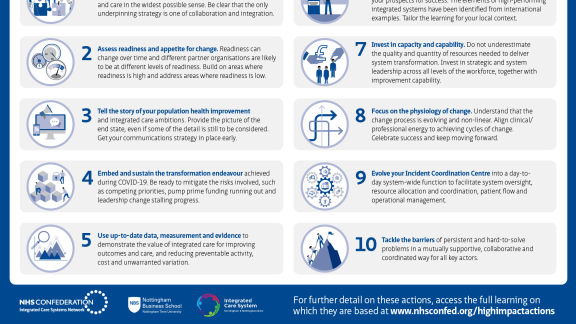The Alzira model gives us a great deal to think about

The Five Year Forward View makes a strong case for overcoming the traditional divide between primary, community, and hospital services, which is increasingly acting as a barrier to the personalised and coordinated healthcare that patients need. To do this, it puts forward a number of new models of care that could help local health communities dissolve these traditional boundaries and move towards a more integrated, patient-centred and sustainable delivery of care.
Refreshingly, it also recognises that we needn’t reinvent the wheel. Some of these new models aren’t in fact new, but have been evolving in one form or another in other countries, with the report reminding us that NHS leaders have much to gain from looking at international experiences and good practice. This includes the accountable care organisation model which has been developed not only in the USA but also much closer to us, in Spain, and which is based on the integration between primary and secondary care providers.
This model of vertical integration is also known as the Alzira model, from the name of the Spanish town in the Region of Valencia where it was first piloted more than ten years ago before being extended to other parts of Spain, including the Region of Madrid.
Under this model, a provider receives a fixed annual sum per local inhabitant (capitation) from the regional government for the duration of the contract, and in return, it must offer free, universal access to a range of primary, acute and specialist health services to the local population. Its success relies on a highly integrated clinical and business model, stretching between and across primary and secondary care. Right along the patient pathway incentives for the different providers in the system are aligned to ensure that work is carried out in the most appropriate, and therefore efficient, care setting.
Other important ingredients for the success of this model have been the use of a unified IT system across all services, with a shared patient record between GPs and specialists, and a rigorous management culture requiring compliance with a set of procedures and guidelines. It also uses incentives for staff to ensure compliance. Patients, who are free to go elsewhere for care costing the provider money, also drive the model to focus on its quality and customer service.
The NHS European Office, part of the NHS Confederation, was a pioneer in identifying this model as one of potential interest for NHS leaders to look at and get inspiration from. Back in 2011, we organised a study visit to Alzira for leaders to understand why and how the model was implemented, the difficulties and challenges it presented, the solutions found to overcome them, and the results achieved in reducing costs and improving patient care.
When comparing the Alzira model with other healthcare providers in the region, some of the results were quite impressive. For example:
- emergency admission rates are 10 per cent (compared to 14 per cent for other hospitals)
- re-admission within three days per 1,000 discharges is four (compared to six in other hospitals)
- outpatient major surgery is over 73 per cent (compared to 50 per cent in other hospitals)
- patient satisfaction (on a scale of zero to ten) is over nine (compared to seven for other providers).
The findings of this visit are outlined in the report we produced after the visit. The Search for Low-Cost Integrated Healthcare – the Alzira Model reviews the model in detail, describing its different implementation phases, documented outcomes, and critically, what the NHS can learn from it.
Following our visit in 2011, the Alzira model has attracted considerable interest in England, both politically and from the service. It has been referred to in different policy debates, and more recently featured in the Five Year Forward View as one of the models for the NHS to look at to help inform our thinking around a whole-system integration approach.
While it is clear that each healthcare system is organised differently and that what works in one country cannot simply or easily be imported by another, it is nevertheless the right time now to reflect on our report on the Alzira model and to think whether this approach is the right one for your institution and, more importantly, your community.
Elisabetta Zanon is director of the NHS European Office. Follow the organisation on Twitter @NHSConfed_EU.



